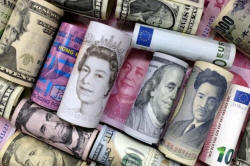|
 Dollar
ticks up against euro with Fed meeting in focus Dollar
ticks up against euro with Fed meeting in focus
 Send a link to a friend
Send a link to a friend
[March 14, 2016]
By Anirban Nag
LONDON (Reuters) - Currency markets were
off to a relatively quiet start on Monday, stabilizing after last week's
wild swings, as investors geared up for Japanese and U.S. central bank
policy meetings that could offer them fresh direction.
|
|
 There are also interest rate decisions from the Swiss, Australian
and Norwegian central banks this week along with the Bank of
England. All these meetings are likely to provide a test of central
banks' ability to successfully manage market expectations, analysts
said. There are also interest rate decisions from the Swiss, Australian
and Norwegian central banks this week along with the Bank of
England. All these meetings are likely to provide a test of central
banks' ability to successfully manage market expectations, analysts
said.
Traders said the euro was little moved by German election results
over the weekend, where Chancellor Angela Merkel and her
conservative CDU party received a drubbing.
Nevertheless, the low-yielding euro shed 0.3 percent to trade at
$1.1110 <EUR=>, hurt in part by rising stock markets, but not far
from a one-month high of $1.1218 set last Thursday when it soared
after the European Central Bank eased extensively while also
signaling that it may limit future interest rate cuts.

The dollar eased against the yen to 113.70 yen <JPY=> having gained
0.6 percent on Friday. Improved risk appetite had lifted the
greenback from a low of 112.225 to as high as 114.45 versus the
safe-haven yen last week.
For dollar bulls, the focus was on the Federal Open Market Committee
meeting. While signs U.S. inflation is picking up will be seen as a
positive, the Fed will be wary of sounding too hawkish, with Chair
Janet Yellen likely to convey a fairly neutral tone.
"The meeting could see an acknowledgement of slightly improved
conditions ... the Fed wants to make sure these developments have
taken hold before acting. Such a dovish message could see downward
pressure on the dollar," said Josh O'Byrne, currency strategist at
Citi.
The Bank of Japan, fresh from adopting negative interest rates in
January, is expected to stand pat when its two-day meeting ends on
Tuesday.
The market will sift through the BOJ's policy statements for any
hints that it may be losing confidence in negative rates after the
ECB suggested it will have to be cautious on cutting ever deeper.
[to top of second column] |

"Despite the large scale ECB easing last week, our economists are
not looking for the BOJ to follow suit, certainly not in terms of a
lower negative rate," said Viraj Patel, currency strategist at ING.
"If anything, the BOJ may look to ease some of the burden on the
financial sector and this may come in the form of a small expansion
of corporate bond/ETF purchases or increased exemptions of funds
subject to the new negative rate policy."
The BOJ's surprise decision to take rates below zero on Jan. 29 did
little to weaken the yen, which eventually soared to a 16-month high
against the dollar last month.
(Additional reporting by Shinichi Saoshiro; Editing by Ruth
Pitchford)
[© 2016 Thomson Reuters. All rights
reserved.] Copyright 2016 Reuters. All rights reserved. This material may not be published,
broadcast, rewritten or redistributed.

 |